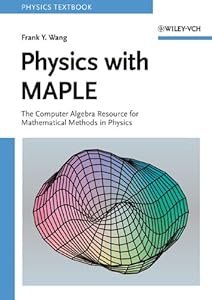#2,416 in Science & math books
Use arrows to jump to the previous/next product
Reddit mentions of Physics with MAPLE: The Computer Algebra Resource for Mathematical Methods in Physics
Sentiment score: 1
Reddit mentions: 1
We found 1 Reddit mentions of Physics with MAPLE: The Computer Algebra Resource for Mathematical Methods in Physics. Here are the top ones.
or
Used Book in Good Condition
Specs:
| Height | 9.4995873 Inches |
| Length | 6.700774 Inches |
| Number of items | 1 |
| Release date | March 2006 |
| Weight | 2.3368999772 Pounds |
| Width | 1.200785 Inches |

My 2c: if you're already familiar with Python, check out sympy. The tutorials are actually quite good!
http://docs.sympy.org/latest/tutorial/
I'm one of these weird software hippys, so I'm not going to lie and say I didn't suggest it because it's free and open-source. However, it really is getting to the point where it's quite stable and usable with the addition that the language it's associated with is indeed a programming language designed to be programmed in by real programmers. I shan't say much on the issue, but there are problems with Maple and Mathematica as programming languages.
The problems with Sympy are that it is not yet so well documented. In particular, there aren't really any complete 'textbooks' as such on the market with more complete examples. For my part, I started as a Maple user and now I use sympy. In addition, there are certain features yet to be implemented. For example, last I checked, the ode solver does not know about the 'classical' differential equations (Hermite, Bessel, Legendre and friends) and often gives garbage when asked to solve them.
I will also point out that the 'giants' Maple (with which I am more familiar) and Mathematica are indeed excellent, robust and well-tested computer algebra solutions. If that's all you're really after, you can't really go wrong. I'm not so familiar with Sagemath, but for stability, useability and quality of documentation, it sits somewhere between Mathematica/Maple and Sympy.
If you needed a book for Maple, the following is the best I've found in the context of theoretical physics:
https://www.amazon.co.uk/d/Books/Physics-Computer-Algebra-Resource-Mathematical-Methods-Textbook/3527406409/ref=sr_1_3?ie=UTF8&qid=1484612452&sr=8-3&keywords=maple+physics
edit: I'd also like to add that while Maple and Mathematica are excellent prototype languages in the context of computational physics and chemistry (and are even quite fast for final implementation for some purposes!), if you're looking to write large-scale simulations, I'd think about learning C, C++ and Fortran and polishing your Python as a prototype language, not least because all are far better documented and have far larger communities.